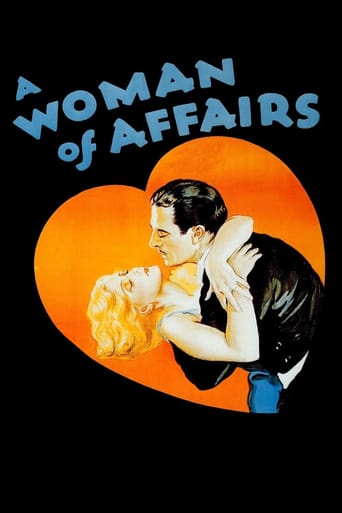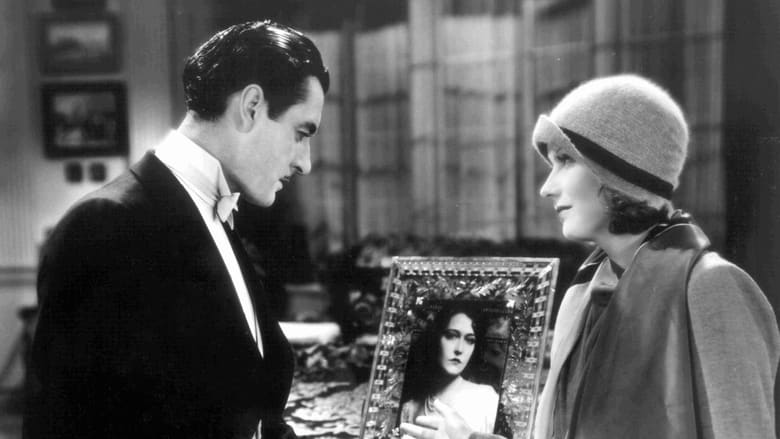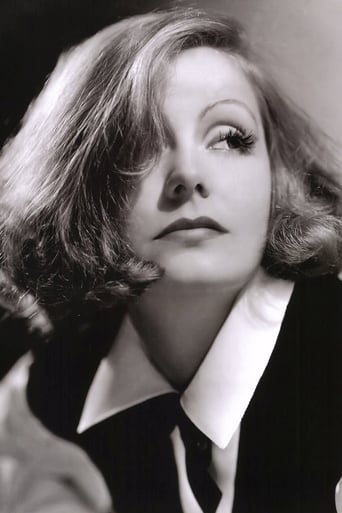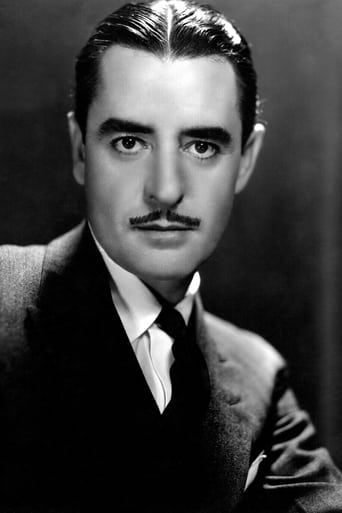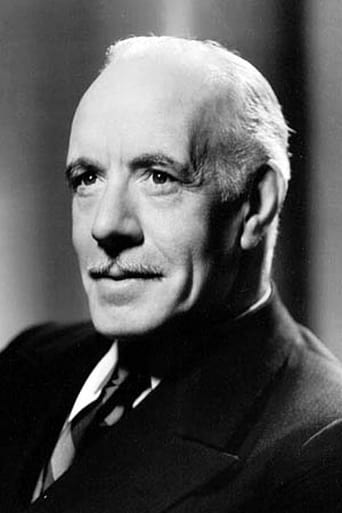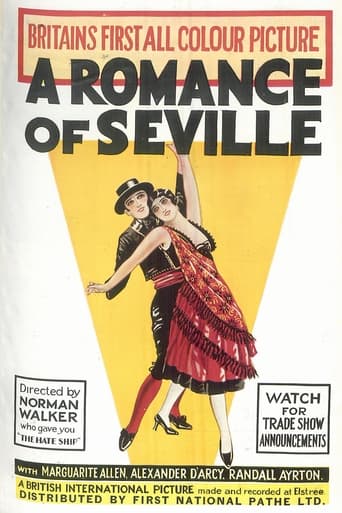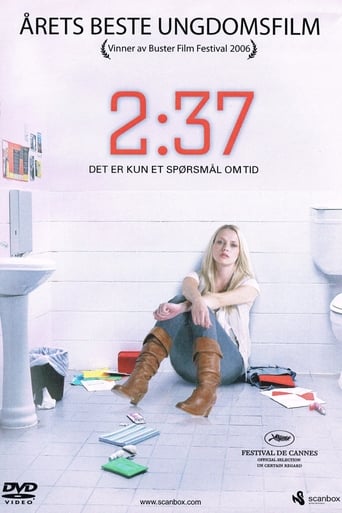A Woman of Affairs (1928)
Childhood friends Diana, Neville and David are caught in a love triangle as adults. Diana and Neville have long been smitten with each other, but her father disapproves of the relationship, resulting in her eventual marriage to David. It's not long after their wedding, however, that tragedy strikes, sending Diana on a downward spiral. When Neville reappears in her life, will he be able to save her from her own misery?
Watch Trailer
Free Trial Channels
Cast


Similar titles
Reviews
Instead, you get a movie that's enjoyable enough, but leaves you feeling like it could have been much, much more.
This is a coming of age storyline that you've seen in one form or another for decades. It takes a truly unique voice to make yet another one worth watching.
It’s fine. It's literally the definition of a fine movie. You’ve seen it before, you know every beat and outcome before the characters even do. Only question is how much escapism you’re looking for.
The movie is made so realistic it has a lot of that WoW feeling at the right moments and never tooo over the top. the suspense is done so well and the emotion is felt. Very well put together with the music and all.
Directed by Clarence Brown, this Michael Arlen story earned Bess Meredyth an Academy Award nomination for Best Writing, Achievement. The film is an above average Greta Garbo silent with John Gilbert, Lewis Stone, Johnny Mack Brown, and Douglas Fairbanks Jr., among others.The plot follows Diana (Garbo in the title role), the carefree daughter of the Merrick family and sister to Jeffry (Fairbanks Jr.), who grew up the childhood sweetheart of Neville Holderness (Gilbert). Anita Louise appears, uncredited, as the child Diana.Unfortunately for the young lovers, Neville's father, Sir Morton Holderness (Hobart Bosworth), disapproves of the "reckless" Merricks, so he sends his son abroad to prevent his further involvement with Diana. Later, Diana ends up marrying David Furness (Brown), who is not only Jeffry's best friend, but the man her brother idolizes most in the World. Lewis Stone plays Dr. Trevelyan, a friend of the Merricks.Some years later, under a mountain of debt unknown to everyone but his wife Diana, the outwardly proper David kills himself to escape his creditors by jumping out a window. Apparently the police are satisfied with calling it an accidental death, but Jeffry and others suspect that Diana was to blame for her husband's death, especially when she spends the next several years on the arms of many wealthy, or otherwise "society paper worthy", escorts. Besides Diana, only Dr. Trevelyan knows the truth.Of course, a reunion with Neville, now married to the beautiful Constance (Dorothy Sebastian) is inevitable. Their one night stand leads to an ill-fated pregnancy for Diana, and drinking by Neville. Constance, ironically, is curious about Diana's notoriety, and causes another reunion between the former lovers later herself.After the earlier loss of his friend and idol David, Jeffry descended into the depths of depression with drugs and/or alcohol, refusing to see the sister he blames as he takes his last breaths and dies in the presence of Dr. Trevelyan.But the title of this film does not mean what you think or, perhaps more precisely, is actually a double entendre. As it turns out, Diana had actually been settling her husband's affairs (e.g. his debts) over all these years such that, in the end, even Sir Holderness comes to respect her.Back within her presence (caused by Constance's aforementioned fascination), Neville is willing to chuck everything (e.g. his marriage) to be with her. But, out of respect for Constance, Diana leaves their home and drives recklessly towards a tree, killing herself. Dr. Trevelyan had revealed the secret of Furness's debts to Neville and now the entire Holderness family mourns her death.
The film's theme is honor in its various guises and how concealing the truth to preserve a dead man's honor brings misery to all concerned. The opening subtitles tell us that Garbo/Diana is a gallant lady. The viewer needs to be told this for otherwise we would conclude that her suffering as well as the suffering caused others was needlessly brought about by her foolish error in judgment. Garbo is perfection in her shifting moods - first as a young woman in love, playful and happy with her true love, Gilbert, then when she makes that fateful mistake which she thinks brings honor to herself, and so on right up to her death 10 years later after her self-image of an honorable woman has been taken from her.Gilbert's role is subsidiary, not sympathetic, and of all things, boring. Most surprising, he lacks fire, There's no passion in his scenes with Diana, except in a late scene in his rooms where Diana breaks through his defenses, telling him she never said "I love you" to any of the other men in her life, only to Gilbert, and that makes her virtuous in Gilbert's code of morality. The actor who does exhibit fire is the young Douglas Fairbanks Jr, whose self-loathing is redirected to a passionate hatred of his sister.I liked Garbo's action in the reconciliation scene where she walks over to Gilbert's father with an unlit cigarette and when he strikes a match she takes out her lighter and lights it herself, thereby emphasizing that she will not bow again to his idea of honor. I also liked the director's choice of showing the widow Diana's 7-year exile in Europe through a series of newspaper photos and their captions. This expedient kept the story focused on the interactions of the main characters. And THE main character, Garbo, is so superb that the script problems make no difference to one's enjoyment of this flawed film.
Garbo is liberated enough to smoke in this film but her lifelong love never gathers the courage to oppose his father and wed her.Here we see the deadening effects of marriage for appearance's sake rather than authentic desire.I've never been taken much with pretty-boy John Gilbert. He strikes me as too perfect-looking to care much about. In this movie, the handsome Hobart Bosworth, who plays his father -- 61 when this was filmed but appearing older -- is far more interesting.I wonder if the real reason Sir Morton stood in the way of his son's romance was his own interest in Diana.In some ways this film doesn't hold together very well.It starts out with an almost slapstick sequence that doesn't go with the serious tenor of the rest of the film. And later, why would those bent on jailing David show up at his honeymoon suite in France and not arrest him on his home turf in Britain? And what was the significance of Garbo drawing the ace of spades before driving off into the night? Clearly she was depressed, but why the implication that a card pushed her over the edge? While the theme of frustrated love is interesting for a bit, this film ultimately peters out disappointingly.
I love silent films but I will be the first to admit that some plots from the early days of film tend to look a bit old fashioned and silly today. While A WOMAN OF AFFAIRS is definitely still watchable, it sure doesn't age well and today many who watch it will find the plot silly--I know I sure did! Despite the presence of the often overrated Greta Garbo, this film lacks believability. Don't believe any reviews that give this film astronomically high ratings simply because they love Garbo--the script is just too flawed to merit scores of 9 or 10.Greta and John Gilbert are in love. However, her family and his are enemies and John's father does his best to keep them apart. John is a bit of a weenie and reluctantly agrees to listen to his dad and take a job in Egypt instead of marrying Garbo. In his mind, he intends to work and make his fortune, then return to marry her. Naturally, though, this absence destroyed their plans and eventually both marry others.She marries a man who turns out to be an embezzler and kills himself on their wedding night. They don't even get a chance to consummate their marriage. However, and this makes no sense at all, Greta spends the rest of the movie being true to her husband--preserving his image as a nice guy. Without telling people, she manages to pay off all his debts and allows everyone to think she drove him to suicide (which, by the way, was really cool to watch)! This was dumb because there was no legitimate reason for this self-sacrifice--especially when Greta's brother (played by a young Douglas Fairbanks, Jr.) refuses to ever talk with her or see her again and pretty much everyone else treats her like a leper. Heck, when Gilbert marries, it's AFTER this incident--if he'd known the truth, he and Garbo surely would have married. Garbo could easily have told everyone--thus avoiding LOTS of trouble and such glaring holes can't be ignored. Later, however, Garbo's one true friend tells Gilbert and his nasty father the truth and everyone agrees that she's a living saint and everyone (including the wife) give Gilbert permission to divorce and marry Garbo!!! Talk about contrived and stupid! So if the plot is so bad and tough to believe, why does it still earn a 6? Well, the film is lovely to look at due to nice cinematography. Also, the acting is good and they make the most of a convoluted and dopey plot. Plus, while nowadays you'd laugh at such silly and contrived plotting, for 1928 it wasn't so bad--audiences made allowances for such plot devices.Also, note that because this film came out before the new tougher Production Code it was grittier and had plot elements that would not have been allowed if they film had come out in 1934. Starting that year, Hollywood needed to have permission to show such violent deaths or talk positively about divorce--something that they never would have granted.

